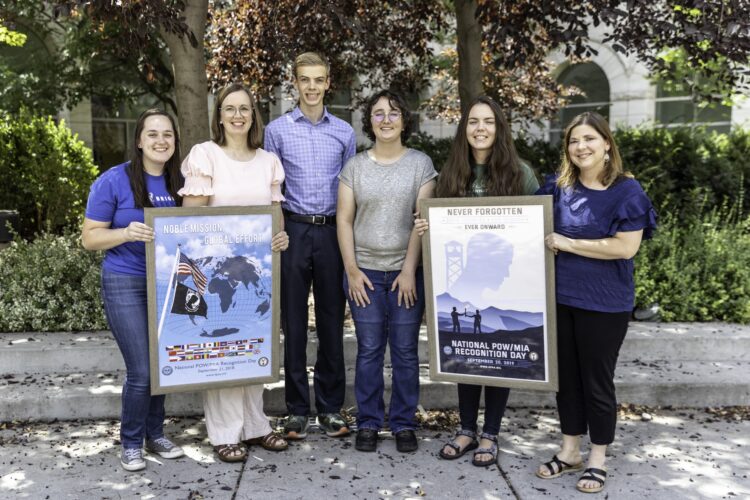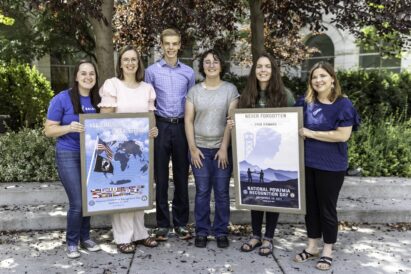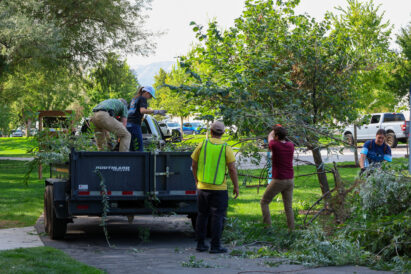BYU: Students aiding the search for America’s missing heroes

Ally Wright, BYU FHSS
A team for students and faculty at Brigham Young University works on a genealogical project for the Defense POW/MIA Accounting Agency to help account for Americans still missing from past conflicts and bring answers to the families of the fallen. Pictured from left to right: Taelor Cordon, Claudia Sudweeks, Ammon Smith, Abigail Adams, Kathleen (KJ) Palmer and Suzanne Adams.Second Lt. Richard E. Harris was stationed in the Pacific during World War II, and it’s been more than 80 years since he was last heard from. He remains unaccounted for since he and approximately 650 prisoners of war perished in the sinking of the Japanese ship Shinyo Maru on Sept. 7, 1944, off the coast of Mindanao, Philippines.
Every third Friday in September is National POW/MIA Recognition Day — a day set aside for Americans like Suzanne Adams, the grandniece of Harris, to commemorate and honor prisoners of war, soldiers who are missing in action, and their families.
Adams has occasion to think about her great uncle more than once a year, though. As an associate professor of history and director of the Center for Family History and Genealogy at Brigham Young University, she oversees a project with the Defense POW/MIA Accounting Agency, supporting their sacred mission to account for Americans still missing from past conflicts and bring answers to the families of the fallen.
This project gives family history students meaningful experience with real-world genealogical research.
“The DPAA project is especially meaningful to me because I know the loss families feel when they don’t know what happened to their loved ones,” Adams said. “I’ve also seen the bittersweet relief families have when our team makes a discovery that helps identify recovered remains and a burial with military honors can move forward.”
More than 80,000 Americans remain unaccounted for from past conflicts.
The DPAA is charged with providing the fullest accounting of missing personnel to their families and the nation. Through historical research, archaeological excavations, DNA testing and other methods, the DPAA identifies remains while BYU family history students dig into historical records to trace family lines and locate living relatives who can provide DNA samples.
A credentialed DPAA Partner Research Fellow is embedded at the university and oversees the students’ work and certifies its accuracy.
Taelor Cordon from Mooresville, North Carolina, is a BYU senior studying genetics and family history who works on the student team supporting the DPAA’s family connections research. “It’s super cool to work with cases that let you see real results from start to end,” Cordon said.
In one notable case, research conducted by students at the center contributed to the identification of the remains of a WWII pilot whose story was later featured in the Los Angeles Times. Family history and DNA research is crucial for supporting DPAA’s identification efforts.
Research Fellow Claudia Sudweeks feels honored to contribute to this project and serve the families whose loved ones made the ultimate sacrifice while serving our country.
“I am grateful for my military and government service heritage,” Sudweeks said. “I was born in an Air Force base hospital and raised near Washington, D.C. Both my father and grandfather were servicemen who saw active duty. My father taught me a reverence for those who lost their lives in service, taking me many times during my youth to visit and pay our respects at the Tomb of the Unknown Soldier.”
Lenore Carrier, a research fellow who worked on the project for three years, said, “Most families deeply appreciate our work. They would often share their stories with me over the phone. I loved hearing these stories because as I helped research the families, I felt like I got to know them, and their stories became precious to me as well.”
The Center for Family History and Genealogy, housed in the BYU History Department, has provided valuable research experience to dozens of student research assistants through their involvement on the DPAA project during the past six years. This project has deepened their connection to history while honing critical DNA research skills.
Beyond seeing the real impact of her work, Cordon also loves that it showcases both her genetics and family history background. “Doing this work gets me excited about future prospects that connect my genetics background with family history,” Cordon said.
Student work on this project prepares others like Cordon for careers in government and law enforcement agencies as well as professional family history and genealogy research firms, libraries and archives. The efforts not only advance the university’s focus on inspiring learning opportunities in undergraduate education but also contribute to the profound national commitment to honoring those who never returned home.
As the nation commemorates National POW/MIA Recognition Day, the BYU Center for Family History and Genealogy proudly reaffirms its commitment to this important work. Through continued collaboration and historical inquiry, the center remains dedicated to ensuring that no hero is forgotten and every family receives the answers they deserve.


